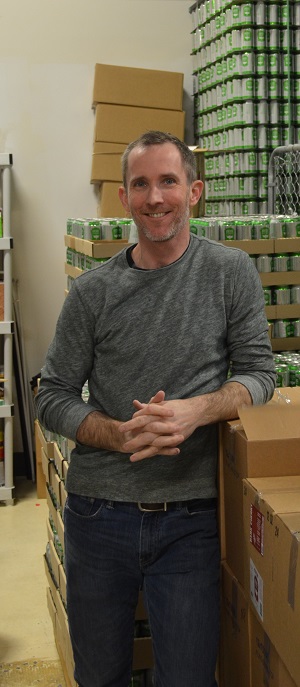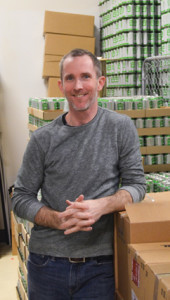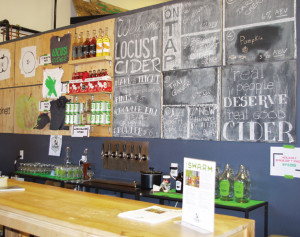When you stack his hard cider company’s name up against firms like Angry Orchard, Scrumpy Jack, and even Reverend Nat’s, Jason Spears ’99 admits that Locust is a bit of an odd moniker for a product you might consider drinking. After all, it doesn’t sound all that appetizing, and it doesn’t boast exotic ingredients. Instead, it’s filled with memories of a brutal attack that almost took the mechanical engineering graduate’s life when he was a teenager.
When he was 13 years old, Spears and his younger brother were hitting golf balls when a group of teens grabbed their golf clubs and began to beat Jason. “I thought I was going to die. He only stopped because he snapped the club in half,” Spears recalls.
Hearing the pulsating, buzzing of locusts while waiting for the ambulance to show up on that hot summer night in his small Texas town not only comforted him, it also inspired him. “I had an extreme moment of clarity and made a decision that I was not going to accept less than the best quality in life,” he says.
About a year after graduating from Mines, Spears promptly followed up on his entrepreneurial vision by opening a Colorado Springs coffee house and a successful night club/restaurant, which attracted the likes of Branford Marsalis and Ziggy Marley. When he tired of running his own eatery, he became a restaurant design consultant, eventually signing on with Starbucks.
Then he found a new passion: hard apple cider.
Spears first discovered cider when he developed an allergy to beer, and he quickly took a shine to the fruit-inspired drink. Although he didn’t know much about the cider business, Spears says his economics classes at Mines taught him to focus on a problem-solving approach, and he quickly found an issue that he could solve.
“I started drinking cider and I didn’t find anything on the market that I liked at the price point I wanted. I am not a deep-pockets kind of guy, and I wanted something that I could buy on a regular basis,” he says. Instead, he had a choice between the high-end ciders he loved, like Dupont Cidre Reserve from Normandy, which sells for up to $20 per 750 ml bottle, or mass market favorites like Ace and Spire, which were the only other widely available options.
In keeping with his focus on quality, Spears knew he wanted to make something that was a step up from the mass produced option. It had to be a craft cider that was good enough to drink with friends, yet still sell for less than $10 a bottle. As a result, he became among the first to buck tradition by using cans instead of bottles, because they seal in the taste, they’re environmentally friendly, and they cut weight-related shipping costs.
By the time Locust was ready to hit the market, the cider craze was already in full swing. Although Spears had planned to start small and operate out of his garage, he quickly realized that he wouldn’t be able to make enough cider to cover licensing, insurance, and other overhead costs. So, he opted for a store-front cidery and tasting room in a strip-mall location where his mix of six ciders on tap—including Original Dry, Dark Cherry, and Thai Ginger—have been attracting customers every weekend. It helps that he set up shop in Woodinville, Washington, a far-flung Seattle suburb known for its wine tasting rooms and distilleries.
If response outside of tourist circles is any indication, Locust is off to a good start. Although it’s only been on the market since March 2015, the cider is already in Whole Foods and the Total Wine chain, as well as another major Northwest grocery chain and 30 restaurants in Washington, Oregon, and Idaho. Spears says he’s also trying to get his cider into California, Arizona, and, of course, Colorado.
“We’re not trying to be the next Angry Orchard,” he says, referring to the highly popular mass-market cider made by Samuel Adams brewery. “We’re not trying to become millionaires, we’re just trying to make enough to keep this going.”
And he owes much of his successful business venture to the sound of a lowly insect.






